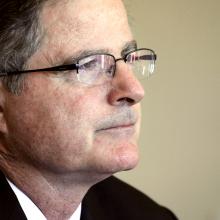Chevron CEO: Governments - Not Oil Companies - Are Responsible For Finding A Solution To Climate
 What does America’s second-largest oil company think about how to deal with global warming? Why, exploit more carbon-intensive resources, of course.
What does America’s second-largest oil company think about how to deal with global warming? Why, exploit more carbon-intensive resources, of course.When questioned about the need to address global warming in an interview with the Associated Press, Chevron CEO John Watson said he believes the only path to global prosperity is more “oil, gas, and coal.”
Watson also said that it’s up to government leaders to find “a better solution for us” when dealing with emissions — not the companies responsible for emitting the carbon pollution heating the planet:
AP: Do fossil fuel producers bear the responsibility for curbing greenhouse gas emissions?
WATSON: We have the responsibility to deliver our energy in an environmentally sound fashion. The greatest advancements in living standards in recorded history have taken place in the modern hydrocarbon era. I don’t think that’s coincidental. Our leaders have to make a decision. Do they want that to continue or do they have a better solution for us? So it’s not my call.
AP: How should society go about reducing greenhouse gas emissions?
WATSON: If you look around the world, the countries with the best environmental practices are the wealthiest. There’s a reason for that. If you’re worried about where your next meal is going to come from or shelter over your head, your focus is on those things.
AP: The U.S. is a wealthy country, how should we reduce emissions?
WATSON: Well, we are a wealthy country. On the other hand, the economy is growing slowly. We have high unemployment. I think that’s part of the reason why the president said now is not the time for a carbon tax, because he recognized that that would put pressure on the economy and put pressure on our energy prices, put pressure on manufacturing business, put pressure on consumers.
AP: When it’s time to address the carbon issue, how should we do it?
WATSON: It’s very difficult for the United States to go it alone. Watch what (other) governments do. The day-to-day decisions being made (show) that concern about climate change is less than other concerns that they have. China is racing by the U.S. in greenhouse gas emissions. Germany is shutting down their nuclear power, the only energy source with zero carbon emissions that can be produced at scale. Japan, much the same way. Governments around the world are making the choice that the benefits of lifting people out of squalor are very important. And affordable energy is the way to get there. And that currently comes through oil, gas and coal.
Naturally, developing more fossil fuels is the solution according to Chevron, the eighth-largest oil company in the world. And developing climate solutions is apparently the responsibility of others.
The view from more impartial observers is remarkably different.
One of the world’s most respected energy institutions, the International Energy Agency, has warned that roughly two-thirds of the world’s carbon reserves must stay underground in order to prevent disastrous global warming.
Even the World Bank — historically a major financial backer of fossil fuel projects around the world — agrees that the world is on a path toward “extreme heat-waves, declining global food stocks, loss of ecosystems and biodiversity, and life-threatening sea level rise” without immediate decarbonization.
The accounting firm PricewaterhouseCooper estimates we would need to quadruple our rate of divestment from fossil fuels through 2050 in order to avoid such a grim warming scenario, warning “we have passed a critical threshold.”
That’s why environmental activists have rolled out a new fossil fuel divestment campaign in order to directly target companies like Chevron that are avoiding responsibility for climate change.
You can return to the main Market News page, or press the Back button on your browser.

